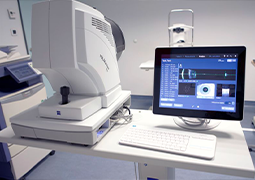Purpose: To compare the accuracy of intraocular lens power calculation formulas and to examine the correlation of this exactness with the axial length for eyes shorter than 22.00 mm
Methods: The data of hyperopic patients who underwent uneventful phacoemulsification between October 2015 and June 2019 were reviewed. The intraocular lens power for each patient was calculated using 6 formulas (Holladay1, SRK/T, Hoffer Q, Holladay 2, Haigis and Barrett Universal II) before cataract surgery. Postoperative refraction was measured, and refractive prediction error was calculated 3 months after phacoemulsification. The correlation between axial length and absolute error was evaluated.
Results: Fifty-six patients (62 eyes) whose ocular axial length ranged between 20.58 mm and 21.97 mm were included in the study. The Hoffer Q formula achieved the lowest mean absolute error of 0.09 (±0.08 D). A significant correlation for the Hoffer Q (ρ = -0.329, p = 0.009) and the SRK/T (ρ = 0.321, p = 0.011) formula was observed.
Conclusions: 1. The Hoffer Q formula obtained the lowest absolute error and was recommended for intraocular lens power calculation for eyeballs with axial length shorter than 22.0 mm. 2. The correlation between axial length and absolute error is a factor which should be considered when calculating intraocular lens power.

